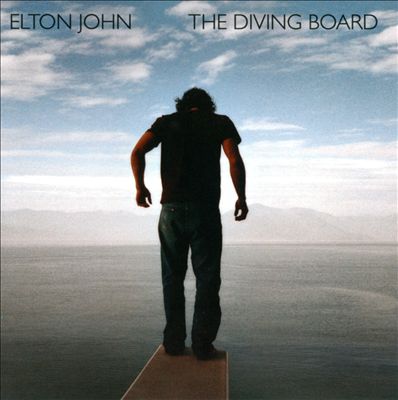
The Diving Board (2014)

1. Oceans Away
2. Oscar Wilde Gets Out
3. A Town Called Jubilee
4. The Ballad of Blind Tom
5. Dream, Pt.1
6. My Quicksand
7. Can't Stay Alone Tonight
8. Voyeur
9. Home Again
10.Take This Dirty Water
11.Dream, Pt.2
12.The New Fever Waltz
13.Mexican Vacation (Kids in the Candlelight)
14.Deam, Pt.3
15.The Diving Board
After the collaborative warmth of The Union, Elton John returned in 2013 with The Diving Board—a stripped-down, introspective collection that, intentionally or not, echoes the very beginnings of his career. Once again working with producer T-Bone Burnett, Elton dials back the arrangements, pulls the spotlight closer, and offers a record that feels more personal than polished, more inward than indulgent.
This is not a record chasing hits. In fact, it doesn't really acknowledge their existence. Much like the early days, before Your Song turned him into a household name, this album is built not for radio, but for reflection. The production is lean—often just piano, bass, and light percussion—which allows the lyrics to breathe and the melodies to settle in slowly. It’s the kind of record that rewards patient listeners more than casual ones.
Longtime partner Bernie Taupin returns as lyricist, and that alone gives the album weight. While the metaphorical bent of Taupin’s writing has occasionally veered into murky waters over the years, here it feels sharp, poetic, and grounded. There’s a weariness to many of the songs, but also a clarity—as if both men, now well into their sixties, are writing with the knowledge that time is precious and legacy is not a given.
Musically, this is Elton very much at the piano—and thankfully so. Burnett’s minimal approach places Elton’s playing front and center, and it’s a joy to hear. Tracks like Oscar Wilde Gets Out and My Quicksand stretch out gently, offering both lyrical richness and melodic nuance. Even the more uptempo numbers, such as Mexican Vacation (Kids in the Candlelight) and New Fever Waltz, keep things relatively grounded. There’s no overproduction here, no sweeping strings or choirs of backup singers—just a handful of players and a lot of trust in the material.
That said, the album isn’t flawless. A few tracks start to sound a bit too familiar, particularly late in the sequence. Take This Dirty Water feels like it’s covering ground already walked two songs earlier, and A Town Called Jubilee—despite its narrative charm—could easily have been lifted from Peachtree Road, for better or worse. And yes, Elton’s voice is showing its age. Some lyrics get lost in the lower register, and there are moments where the delivery turns slightly muddy. But to complain about that now feels almost irrelevant. The emotion is still there. The connection is still there as well.
More than anything, The Diving Board feels like a conscious return to craft. It’s not flashy, and it’s certainly not aiming for mainstream success. It’s an album made by an artist who no longer needs to chase relevance, and who seems content making music that matters to him—and, by extension, to those who’ve followed him for the long haul.
It may not be a masterpiece, but it comes close—and in its quiet, dignified way, it might just be one of the most honest records Elton has made in decades. If this had ended up being the final chapter, it wouldn’t have been a bad note to go out on.
Fortunately, it wasn’t.
Go back to the main page
Go to the Next Review